Who have been Scotland's first ministers?
- Published
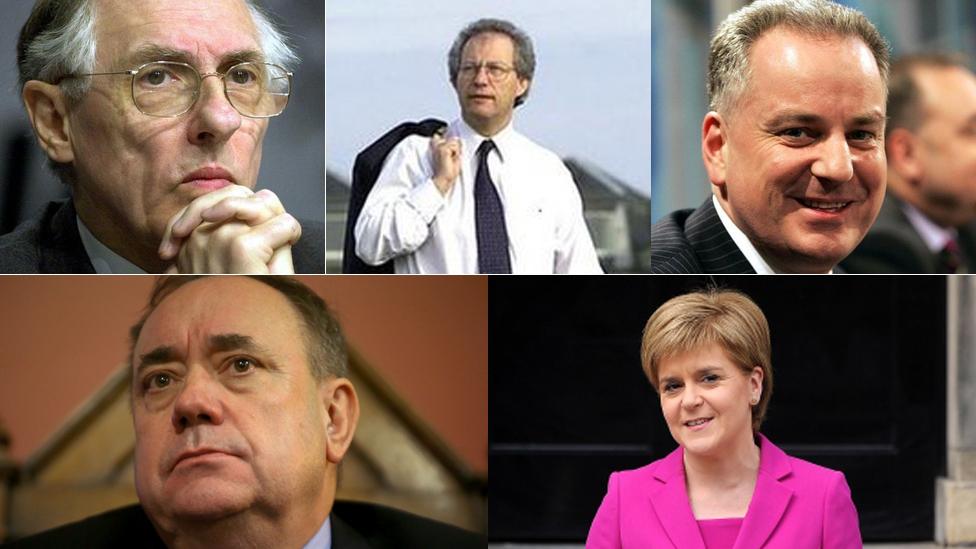
Five politicians have served a first minister since the devolved Scottish Parliament was created in 1999
Nicola Sturgeon is set to continue as Scotland's first minister following the SNP's victory in the Scottish Parliament election on 5 May 2016.
Ms Sturgeon became first minister on 20 November 2014, following the resignation of Alex Salmond.
She is the fifth politician to head Scotland's devolved government (not counting Jim Wallace, who served as acting first minister three times.)
Here's a quick look at Scotland's leaders, past and present, and the legacies they have left.

Donald Dewar: 13 May 1999 - 11 October 2000
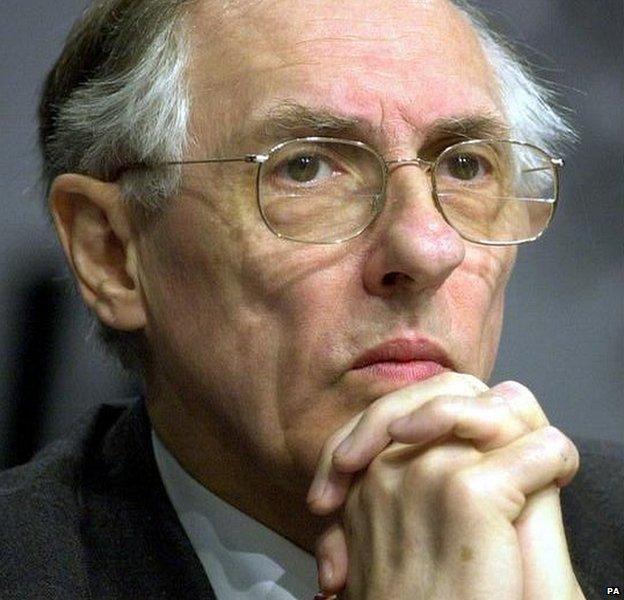
Donald Dewar secured his place in history when he became first minister of the first Scottish Parliament in almost 300 years, but his time in the role was cut sadly short.
He was known for an astute legal brain, fierce, fast and formidable debating skills and squaring up to the opposition benches.
Not a typical Labour man, he was born in Glasgow on 21 August 1937 into a middle class family and studied law before entering the Commons in 1966 as MP for Aberdeen South and, later, represented the seat of Glasgow Garscadden.
His loyalty in the shadow cabinet during Labour's wilderness years saw him rewarded with the post of secretary of state for Scotland by Tony Blair in 1997 - the vehicle by which he helped bring about devolution two years later, earning him the title "Father of the Nation".
Mr Dewar became MSP for Glasgow Anniesland, but his new administration was soon embroiled in an access-to-ministers scandal, the Holyrood building fiasco and the repeal of Section 28.
He admitted the first year was "towsy".
Despite an operation to replace a leaky heart valve and being two years off becoming a pensioner, he was determined to resume his key role in politics.
On 10 October 2000, Mr Dewar fell on the pavement outside his official residence and later died from a brain haemorrhage.
Mr Dewar's legacy lives on through the devolved parliament itself, and a towering statue of the man himself in Glasgow city centre.

Henry McLeish: 26 October 2000 - 8 November 2001
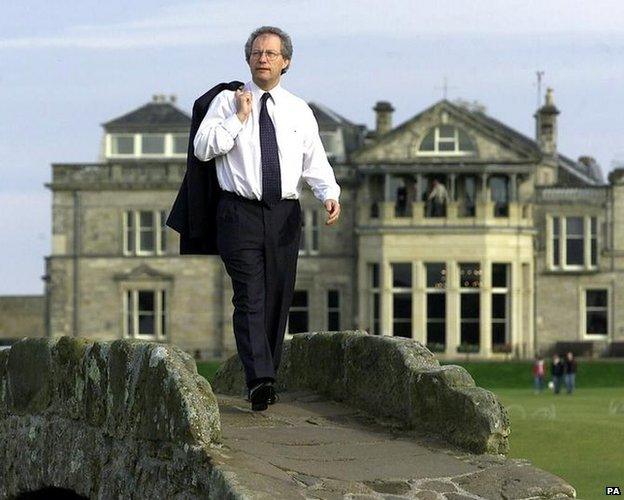
Whatever Henry McLeish's achievements in politics, his tenure in office will always be marked by having been the only Scottish first minister forced to resign from the job.
The former professional footballer cut his political teeth in Fife in the early 1970s, working his way through the echelons of Kirkcaldy District Council and Fife Regional Council to be elected Labour MP for Fife Central in 1987.
He served on the shadow benches before becoming a devolution minister in the former Scottish Office, playing a key role in delivering the Scottish Parliament in 1999.
Mr McLeish was regarded as a competent parliamentary performer, and was seen as a safe pair of hands to take over the reins following the death of Donald Dewar.
But there were doubts about the presence of a "common touch" and the ability to control rebellion in the ranks.
Nevertheless, he masterminded the introduction of Scotland's historic scheme to provide free personal care for the elderly.
The Fife MSP's downfall came during a row over his Westminster constituency office expenses, dubbed "Officegate".
The episode was made worse by Mr McLeish's inability to resolve the matter in the eyes of the public and media, and he eventually stood down as first minister, describing his actions as "a muddle, not a fiddle".
Mr McLeish's post-Holyrood years have seen him lecture widely in the United States.
He has also served on several SNP government investigations and commissions looking into a range of issues, including prisons, football, broadcasting and colleges.
That, along with his post-2007 commentary about Labour's woes, during which he lambasted the party's "culture of denial", led some observers to cheekily question whether he was "going Nat".

Jack McConnell: 22 November 2001 - 16 May 2007
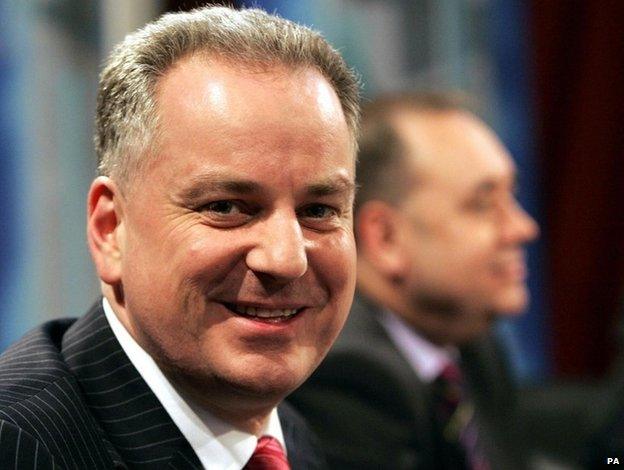
Elected Labour MSP for Motherwell and Wishaw in 1999, the former maths teacher came to the fore after taking up the "poisoned chalice" of education minister, tackling a crisis at the Scottish Qualifications Authority head-on.
Following Henry McLeish's resignation, Lord McConnell won the job - openly admitting to a previous extra-marital affair in the process - and taking on the post while wondering whether devolution could survive.
As first minister, he saw through the ban on smoking in public places and forged new links with the African country of Malawi, one of the poorest in the world, which have been maintained to this day.
He stood down as Scottish Labour leader after the SNP's 2007 election win, moving to the backbenches for four years.
Mr McConnell was due to become British High Commissioner to Malawi in 2009 but, before having a chance to take up the post, the then prime minister Gordon Brown decided to appoint him his "special international representative on strengthening conflict resolution capacity".
The move provoked speculation that it would avoid a Labour by-election defeat in Motherwell and Wishaw.
After being made a life peer, taking the title Lord McConnell of Glenscorrodale, he announced a move to leave Holyrood.
He also expressed his wish to work in post-conflict reconstruction and campaign for vulnerable young people.
Despite the odd gaffe - including having to reverse a decision to attend a golf club dinner rather than D-Day commemorative events in Normandy and once telling a group of high school pupils it was okay to get drunk "once in a while" - Lord McConnell says he is immensely proud of his achievements as first minister.
In his parting shot to Holyrood, Lord McConnell said the Scottish Parliament was failing in its role as a focal point for national debate and ministerial scrutiny and was in need of "radical change".
And as Mr Salmond's milestone as longest-serving first minister approached in November 2012, Lord McConnell took to Twitter, cheekily writing: "This might be my last ever night as 'longest serving First Minister of Scotland'. Maybe overtaken tomorrow? Still the youngest though!"

Alex Salmond: 16 May 2007 - 19 November 2014
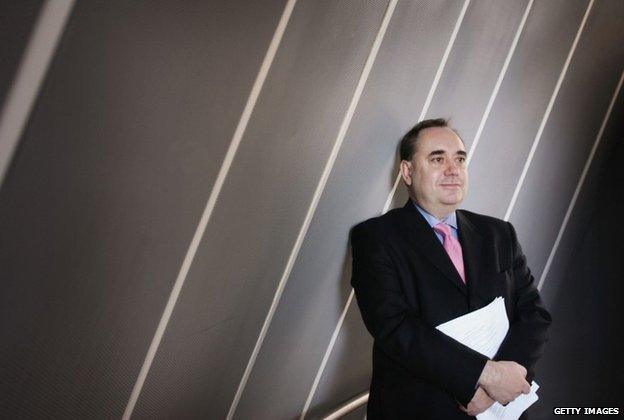
Seen as one of the most talented politicians of his generation, Alex Salmond already had a high-profile before he won two historic Holyrood elections as SNP leader, securing the mandate to hold a referendum on Scottish independence in the process.
Born in 1954 in Linlithgow, Mr Salmond graduated from St Andrews University and began a career in economics, working for the Scottish Office and the Royal Bank of Scotland.
Despite earning himself a brief expulsion from the SNP in 1982 for his role in the breakaway '79 Group, he began his parliamentary career as MP for Banff and Buchan in 1987, building himself a high-profile.
He served as party leader from 1990, standing down after 10 years only to make a dramatic comeback to the SNP's top job before winning the 2007 Holyrood election.
Often derided by his political opponents as arrogant and self-serving, Mr Salmond nonetheless succeeded in turning his party into the most popular in the history of devolution, on his platform of fighting for Scottish interests.
Despite a hard-fought campaign on the "Yes" side, voters rejected independence by 55% to 45% in the 18 September vote and, the following day, Mr Salmond announced he was standing down as first minister and SNP leader.
After more than seven years as first minister, there is little doubt Mr Salmond has changed the course of Scottish politics forever.

Nicola Sturgeon: 20 November 2014 - Ongoing
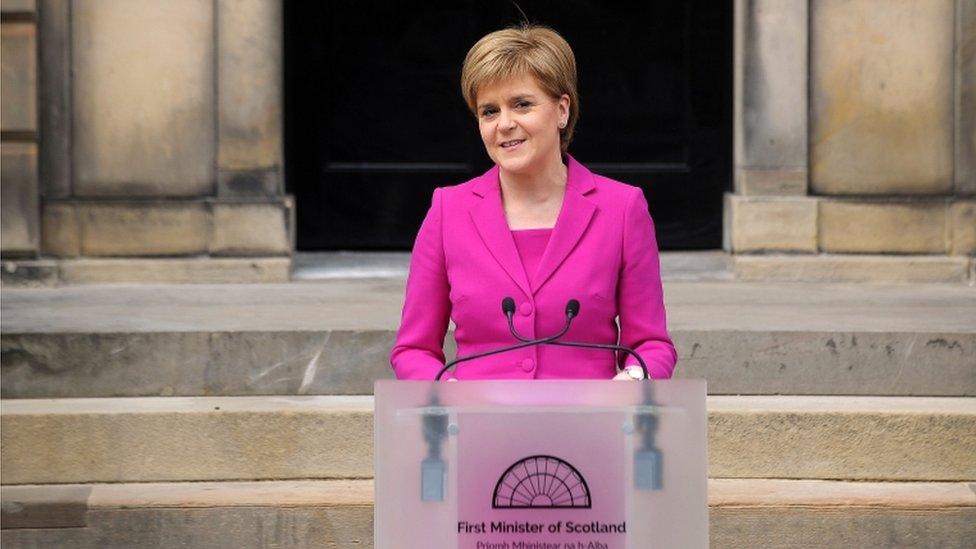
Born in the North Ayrshire town of Irvine in 1970, Ms Sturgeon joined the SNP at the age of 16, when Margaret Thatcher was prime minister.
Ms Sturgeon said her decision to become an SNP member rather than Labour was borne from a "strong feeling that it was wrong for Scotland to be governed by a Tory government that we hadn't elected" and that the country would only truly prosper with independence.
After studying law at Glasgow University and working as a solicitor at the city's Drumchapel Law Centre, Ms Sturgeon's entry into full-time politics came at the age of 29, when she was elected to the new Holyrood parliament in 1999, as a Glasgow regional MSP.
She gained an early reputation for being overly serious, which earned her the nickname "nippy sweetie".
When John Swinney resigned as SNP leader in 2004, Ms Sturgeon launched a leadership bid before withdrawing from the race once Alex Salmond unexpectedly threw his hat into the ring.
Ms Sturgeon agreed to become Mr Salmond's deputy, standing in for him as the party's "Holyrood leader" while Mr Salmond remained an MP at Westminster.
After the SNP's victory in the 2007 election, Ms Sturgeon became Scotland's deputy first minister and health secretary, seeing through popular SNP pledges such as the reversal of A&E closures and the abolition of prescription charges.
She also won praise for her handling of the swine flu crisis, and played a large part in the SNP's historic majority in the 2011 election.
Ms Sturgeon later described the result - and the dismantling of Labour strongholds across the country - as having broken the mould of Scottish politics, and put the SNP's success down to being "in touch with the country it served".
Ms Sturgeon subsequently accepted one of the Scottish government's biggest roles, overseeing the 2014 independence referendum, and was the obvious successor to Mr Salmond when he stood down as both first minister and SNP leader after voters rejected independence by 55% to 45%.
In her first six months in the job, Ms Sturgeon led the SNP to a stunning success in last year's general election, when the party won 56 of the 59 seats in Scotland.
The party also won a third successive victory in the Scottish Parliament election on 5 May 2016, when it won 63 of the 129 seats - short of a majority, but all but guaranteeing Ms Sturgeon will remain as first minister.
Ms Sturgeon is married to Peter Murrell, who is chief executive of the SNP. The pair wed in 2010, after meeting 15 years previously at an SNP youth weekend in Aberdeenshire.

Jim Wallace: Between 1999 and 2001
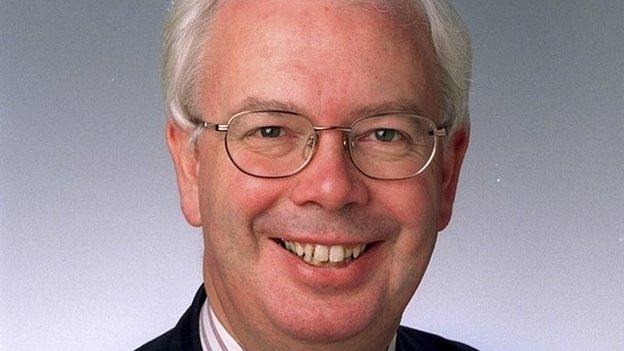
Liberal Democrat Jim Wallace never held the post of first minister on a permanent basis but was called on to do the job on three occasions when sickness, death and scandal befell the Labour incumbent.
The politician, now known as Lord Wallace of Tankerness, became deputy first minister in 1999, staying in the post until his resignation as Scottish Liberal Democrat leader on a high, following a good night at the polls for his party in the 2005 UK election.
He studied law at Edinburgh University and worked as an advocate before entering parliament in the 1983 General Election as MP for Orkney and Shetland.
Mr Wallace joined the Liberal Party in 1972 and became its Scottish party leader in 1992, before being elected MSP for Orkney when devolution happened in 1999.
When no clear winner emerged in the first devolved government, Mr Wallace's Liberal Democrats agreed to become Labour's coalition partner.
He credits his party's role in the coalition for bringing about policies like scrapping up-front tuition fees, free personal care and Scotland's "right to roam" land reforms.
But it was not all plain sailing when, as Scottish justice minister, Lord Wallace was forced to perform a series of u-turns, with plans to ban smacking, close Peterhead jail and open up children's hearings to over-16s all dropped.
Less than a year after devolution, Mr Wallace took up the post of first minister when Donald Dewar became ill, stepping in again when he died in October 2000.
When Mr McLeish quit in 2001, Lord Wallace found himself, albeit briefly, back in the hot seat, and his efforts saw him named Scottish Politician of the Year.
After his move to the Lords and a bit of a back seat, Lord Wallace again found himself in government, putting his political and legal skills to use as Advocate General for Scotland in the UK coalition.